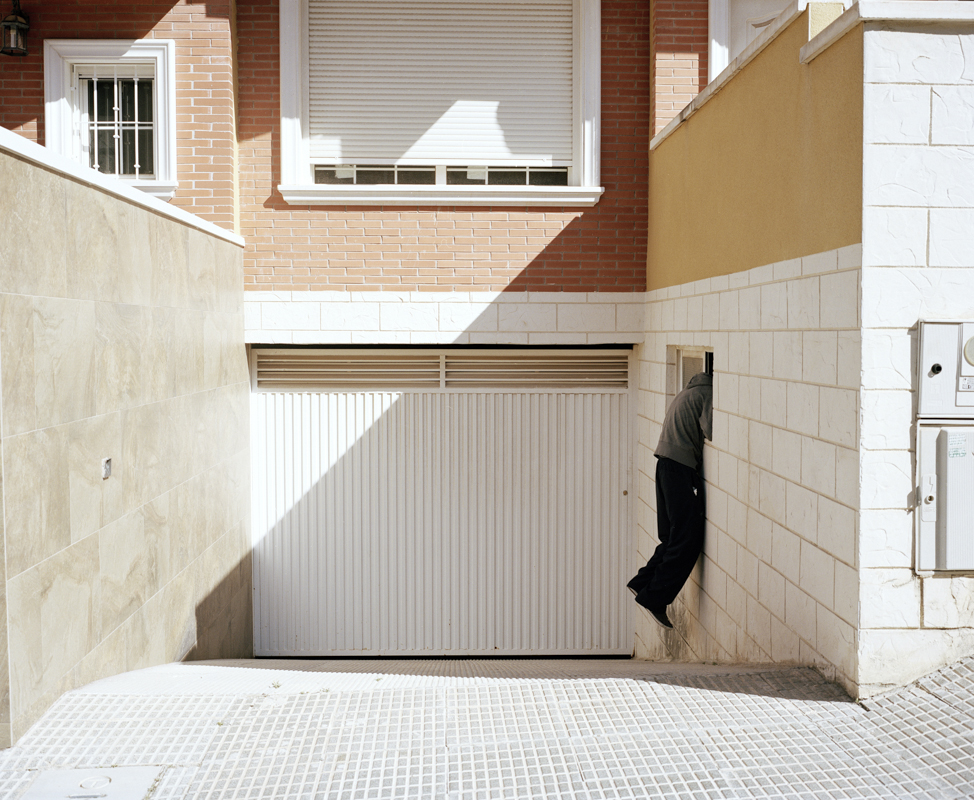
Crónica21 – Documenting Spain’s Downfall
[vc_row row_type=”row” use_row_as_full_screen_section=”no” type=”full_width” text_align=”left” css_animation=””][vc_column][vc_column_text]
Cronica21 Archive: Building a Picture of the Present.
Ana Hernandez has just turned 40 and has been unemployed for 16 months now. An architect from Barcelona, she has worked for different architecture firms all of her adult life. She is multi-lingual, and well respected by those in and outside of her professional field. However, Ana cannot find a job and her unemployment benefits are running out. She is a separated mother of two and a homeowner with a mortgage to pay.
She starts with smaller decisions. She sells the car, skips the newspaper, buys generic instead of brand names, and picks her kids up early from school to save on lunch. She feels anxious about the future, sleeps poorly, and snaps at her kids regularly. Her mother offers to help, but she is already supporting Ana’s brother who has been unemployed for over two years. One elderly person’s pension is not nearly enough to hold everyone together.

Image Credit: Jordi Ruiz – The Parallel Society
There are now hundreds of thousands of Anas all over Spain, and many who are far worse off. Although stories like hers are commonplace, they still strike a nerve.
When Ana was a child the future looked very different. With the passing of Franco in 1975, Spain’s democratic institutions were set in motion. In 1986 Spain joined the European Union and during the following decades, the country saw a period of strong economic growth, with massive investment in infrastructure and rapid urbanization.

Image Credit: Joan Alvado – The Lab
The global recession that began in 2008, however, has shown Spain to be particularly vulnerable to the neo-liberal economic policies of the EU. Under continued austerity programs mandated by Brussels, the economy has suffered a two-dip recession and national unemployment rates have risen to 26%, with significant peaks according to region (44% in the province of Cadiz) and by age group (youth unemployment at 56%).
With over 6 million unemployed nationally, Spain has not experienced such economic and social deprivation for more than 50 years. In poorer regions such as the Canary Islands, Andalusia and Extremadura, almost a third of the population is below the at-risk-of-poverty line, according to the National Statistics Institute. This is ominous news for Spain and also for Europe.

Image Credit: Groundpress Collective – Deshaucios
Restricted by the euro and unable to devalue its currency, Spain has little room to manoeuvre. And as the cases of corruption and misuse of public money pile up, they are causing people like Ana to feel betrayed by the very institutions that once promised them a stability and hope for the future. What has emerged in Spain since 2008 is a growing, corrosive sense of distrust in the government, political process and private sector that is weakening the social fabric.
What will it take to begin to turn the situation around? This question is central to association Al-liquindoi’s new project, Crónica21.

Image Credit: Javier Corso – Invisibles
For more than a decade, association Al-liquindoi has trained visual storytellers in Spain and internationally. Now, taking its inspiration from US President Franklin Roosevelt’s New Deal initiative that hired photographers and writers to document the impact on rural America of the 1930s Great Depression, it has created Crónica21 to tell stories in the common interest.
Launched in early May, Crónica21is a free, online, multimedia archive about Spain’s political, social and economic crisis, and the devastating impact it has on everyday lives. It brings into one accessible central repository revealing stories and analysis of Spain’s current situation, much of which has not previously reached a broad audience, using the tools of photography, video, illustration, audio and text.

Image Credit: Xavier Galiana – Retrato de una
Crónica21 has to date archived over 100 projects, and that is just a start. This material includes work by photographers like Olmo Calvo, Elisenda Pons, Carlos Spottorno, and Julián Barón; songs like 30 metros by Chico Ocaña, Marca España by Tejero, or No Fear by At Versaris; and films like €spanish Dr€am by Guillermo Cruz and Santiago Cirugéda and Manos Arriba, esto es un contrato by Javier Gascón. There are links to books and also drawings by illustrators like Enrique Flores and Manel Fontdevila. It highlights journalists and writers like Juan Luis Sánchez of eldiario.es, and Andreu Missé of Alternativas Económicas.
As Crónica21 brings stories of what is happening in Spain to a broad audience, it helps people like Ana better understand the reality unfolding around them. In addition to showcasing work that has already been produced and deserves to be more widely seen, it is promoting the production of new, in-depth stories addressing the causes and consequences of the crisis, and solutions being sought by Spaniards.
Rooted in the conviction that knowledge is power, Crónica21 is implementing innovative ways to take this material from the online archive into the public sphere in an effort to enable people throughout Spain and beyond to engage with the fundamental question: where can we go from here?
Check out Crónica21 here: cronica21.org
To help them continue their work, donate here: verkami.com/locale/en/projects/8628
Jessica Murray is the director of Association Al-liquindoi, a organisation that conducts workshops in long-term visual storytelling in Spain and internationally. She is Based in Barcelona, Spain.
[/vc_column_text][/vc_column][/vc_row]


